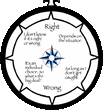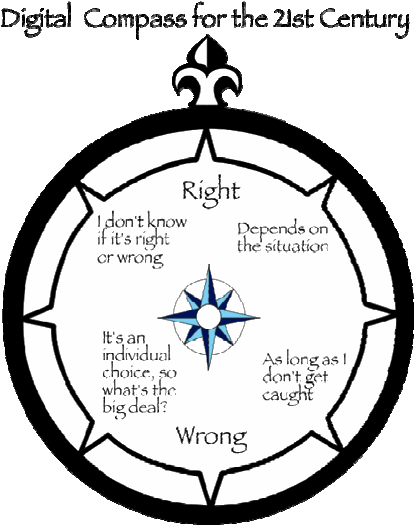
The Digital Compass Game
Share your reflections on the Compass Game discussion blog!
Reflect and discuss your understanding of Safe & Ethical Use of technology within scenarios below. There is no easy answer for any of the scenarios. In most instances, responses are going to be varied. Why? Technology users are not always going to agree on what is “right and wrong.” Often when using technology there are “shades of gray” depending on who interprets the question. When interpreting each scenario, users need to consider not only their feelings but feelings of others. The purpose of the compass metaphor activity is to help you analyze the concept of technology use and misuse.
For those scenarios that you know you don't know SEARCH for an answer with the button below!
Reflect and discuss your understanding of Safe & Ethical Use of technology within scenarios below. There is no easy answer for any of the scenarios. In most instances, responses are going to be varied. Why? Technology users are not always going to agree on what is “right and wrong.” Often when using technology there are “shades of gray” depending on who interprets the question. When interpreting each scenario, users need to consider not only their feelings but feelings of others. The purpose of the compass metaphor activity is to help you analyze the concept of technology use and misuse.
For those scenarios that you know you don't know SEARCH for an answer with the button below!
|
Scenario #1 – A student sends a harassing e-mail to another
student. The receiving student retaliates with a “flaming e-mail.” Is sending
harassing and flaming e-mail
messages wrong?
Scenario #2 – When hanging out with friends, one of the students gets a cell phone call and conducts a loud conversation. Is talking in a loud voice on a mobile phone in a public place right? Scenario #3 – A student logs on to a file sharing website and downloads the newest song. Is downloading music from a file-sharing site wrong? Scenario #4 – A student follows a questionable link to a website and downloads a malicious script which releases a Trojan Horse virus on to the school network. Is downloading material from unknown sites appropriate? Scenario #5 – An hour before class, a student remembers that a writing assignment is due. The student goes to the library, logs on to a website, and copies/pastes information without giving credit to the authors. Is using Internet materials without giving credit to the authors wrong? |
Scenario #6 – At home, a student uses a software package to copy movies and games from DVD’s for his or her friends. Is copying copyrighted materials right?
Scenario #7 – A student logs into the schools’ course management system to download a copy of the course syllabus that they had lost. Is online learning appropriate for K-12 students? |
Scenario #8 – Two students use text messaging on their cellular phones to pass information with each other during class. Is it wrong to send text-messages during class?
Scenario #9 – A team of students create a website for a teacher at school, but the website cannot be read by students with special needs (disabilities). Is it right to make websites that are not accessible to students with disabilities? Scenario #10 – A student brings a USB flash drive to school with all their assignments. The student checks with the teacher before connecting the drive to the schools’ computer. Is it appropriate for students to bring foreign materials to be connected to school property? Scenario #11 – During class, students uses their handheld computers to share answers to an assignment. Is it wrong to share information during class? Scenarios #12 – Students obtain a copy of the final exam for the teacher’s computer by "hacking" the password. Is hacking into the teacher’s computer wrong? |
Now proceed to...

